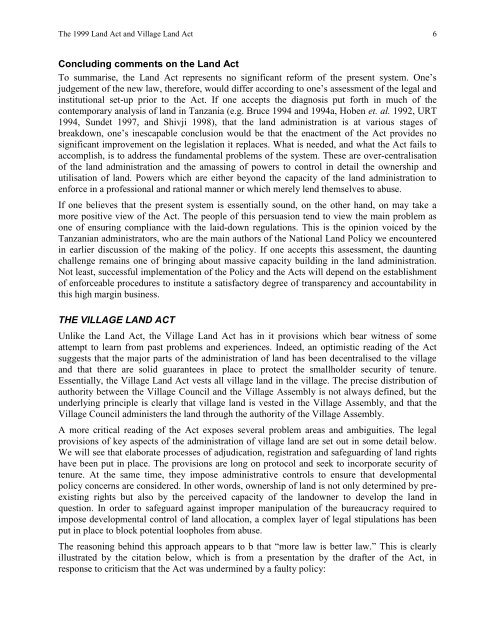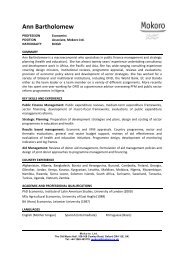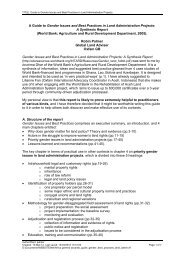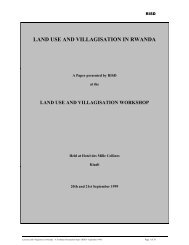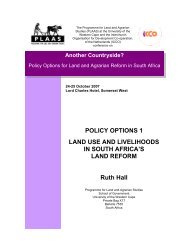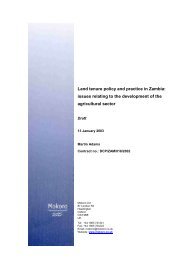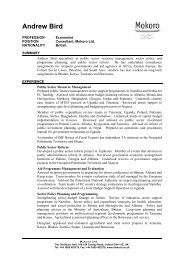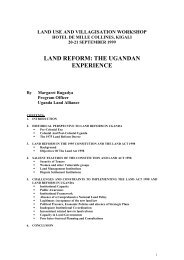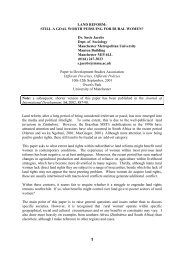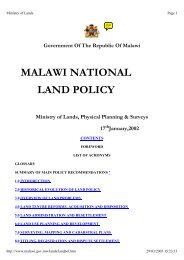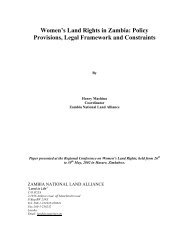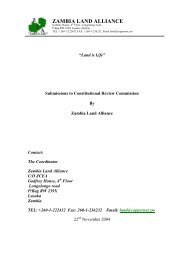The 1999 Land Act and Village Land Act - Mokoro
The 1999 Land Act and Village Land Act - Mokoro
The 1999 Land Act and Village Land Act - Mokoro
You also want an ePaper? Increase the reach of your titles
YUMPU automatically turns print PDFs into web optimized ePapers that Google loves.
<strong>The</strong> <strong>1999</strong> <strong>L<strong>and</strong></strong> <strong>Act</strong> <strong>and</strong> <strong>Village</strong> <strong>L<strong>and</strong></strong> <strong>Act</strong> 6Concluding comments on the <strong>L<strong>and</strong></strong> <strong>Act</strong>To summarise, the <strong>L<strong>and</strong></strong> <strong>Act</strong> represents no significant reform of the present system. One’sjudgement of the new law, therefore, would differ according to one’s assessment of the legal <strong>and</strong>institutional set-up prior to the <strong>Act</strong>. If one accepts the diagnosis put forth in much of thecontemporary analysis of l<strong>and</strong> in Tanzania (e.g. Bruce 1994 <strong>and</strong> 1994a, Hoben et. al. 1992, URT1994, Sundet 1997, <strong>and</strong> Shivji 1998), that the l<strong>and</strong> administration is at various stages ofbreakdown, one’s inescapable conclusion would be that the enactment of the <strong>Act</strong> provides nosignificant improvement on the legislation it replaces. What is needed, <strong>and</strong> what the <strong>Act</strong> fails toaccomplish, is to address the fundamental problems of the system. <strong>The</strong>se are over-centralisationof the l<strong>and</strong> administration <strong>and</strong> the amassing of powers to control in detail the ownership <strong>and</strong>utilisation of l<strong>and</strong>. Powers which are either beyond the capacity of the l<strong>and</strong> administration toenforce in a professional <strong>and</strong> rational manner or which merely lend themselves to abuse.If one believes that the present system is essentially sound, on the other h<strong>and</strong>, on may take amore positive view of the <strong>Act</strong>. <strong>The</strong> people of this persuasion tend to view the main problem asone of ensuring compliance with the laid-down regulations. This is the opinion voiced by theTanzanian administrators, who are the main authors of the National <strong>L<strong>and</strong></strong> Policy we encounteredin earlier discussion of the making of the policy. If one accepts this assessment, the dauntingchallenge remains one of bringing about massive capacity building in the l<strong>and</strong> administration.Not least, successful implementation of the Policy <strong>and</strong> the <strong>Act</strong>s will depend on the establishmentof enforceable procedures to institute a satisfactory degree of transparency <strong>and</strong> accountability inthis high margin business.THE VILLAGE LAND ACTUnlike the <strong>L<strong>and</strong></strong> <strong>Act</strong>, the <strong>Village</strong> <strong>L<strong>and</strong></strong> <strong>Act</strong> has in it provisions which bear witness of someattempt to learn from past problems <strong>and</strong> experiences. Indeed, an optimistic reading of the <strong>Act</strong>suggests that the major parts of the administration of l<strong>and</strong> has been decentralised to the village<strong>and</strong> that there are solid guarantees in place to protect the smallholder security of tenure.Essentially, the <strong>Village</strong> <strong>L<strong>and</strong></strong> <strong>Act</strong> vests all village l<strong>and</strong> in the village. <strong>The</strong> precise distribution ofauthority between the <strong>Village</strong> Council <strong>and</strong> the <strong>Village</strong> Assembly is not always defined, but theunderlying principle is clearly that village l<strong>and</strong> is vested in the <strong>Village</strong> Assembly, <strong>and</strong> that the<strong>Village</strong> Council administers the l<strong>and</strong> through the authority of the <strong>Village</strong> Assembly.A more critical reading of the <strong>Act</strong> exposes several problem areas <strong>and</strong> ambiguities. <strong>The</strong> legalprovisions of key aspects of the administration of village l<strong>and</strong> are set out in some detail below.We will see that elaborate processes of adjudication, registration <strong>and</strong> safeguarding of l<strong>and</strong> rightshave been put in place. <strong>The</strong> provisions are long on protocol <strong>and</strong> seek to incorporate security oftenure. At the same time, they impose administrative controls to ensure that developmentalpolicy concerns are considered. In other words, ownership of l<strong>and</strong> is not only determined by preexistingrights but also by the perceived capacity of the l<strong>and</strong>owner to develop the l<strong>and</strong> inquestion. In order to safeguard against improper manipulation of the bureaucracy required toimpose developmental control of l<strong>and</strong> allocation, a complex layer of legal stipulations has beenput in place to block potential loopholes from abuse.<strong>The</strong> reasoning behind this approach appears to b that “more law is better law.” This is clearlyillustrated by the citation below, which is from a presentation by the drafter of the <strong>Act</strong>, inresponse to criticism that the <strong>Act</strong> was undermined by a faulty policy:


